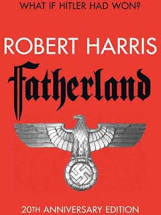Fatherland by Robert Harris

I usually enjoy alternative history novels but I felt uncomfortably sad, anxious and angry reading Fatherland by Robert Harris.
The story imagines how the world would be after Hitler won World War Two. Berlin, where much of the story is set, in 1964 is a grand city with a Arch of Triumph that is bigger than the Arc de Triumph in Paris, a Palace that Hitler resides in that is bigger than the Palace of Versailles and a Great Hall so enormous that the dome generates its own climate.
Xavier March is a Homicide Investigator with the Kriminalpolizei who took on a case to investigate the death of an elderly man found dead in a lake just a week before the American President, Joseph P. Kennedy (JFK’s father) was scheduled to make an historic visit to Germany. Xavi, whose investigation was more diligent than wise, soon discovered that the dead man had a number of Nazi colleagues who had also been murdered recently. Instead of giving up the case as he was ordered to, Xavi continued trying to work out what the murdered men had in common and why they had been murdered.
Xavi teamed up with an American journalist, Charlotte Muguire during his investigations and although he didn’t entirely trust her, he found himself travelling with her to Zurich to visit the murder victim’s Swiss bank to view the contents of his bank vault. There, Xavi discovered priceless art presumably pilfered during WW2.
Eventually Xavi and Charlie learned that the murdered men had been instrumental in planning and carrying out the Final Solution, the extermination of Jewish people from Germany and throughout Europe. This came as a shock to Xavi, who along with most German people believed (or wanted to believe) that the Jewish people had been relocated to eastern Europe.
Xavi and Charlie’s lives were endangered as the Gestapo realised they might tell the world what they had discovered about the Jewish people, particularly with the upcoming visit from Kennedy looming.
The story which cleverly mixes real people and events into the fiction, is very well written and plausible. I will read more books by Robert Harris in future, but I found the plot of Fatherland distressing. I was very glad to finish this book.

Recent Comments